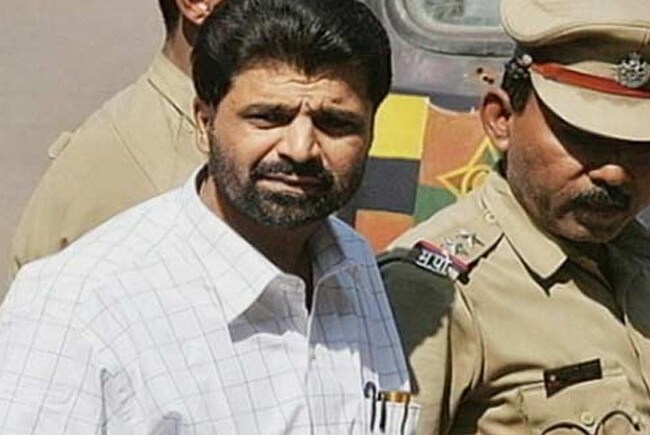
File photo of Yakub Memon
New Delhi:
Unless a last-minute appeal from Yakub Memon is accepted by the Supreme Court, he is likely to be hanged next week for financing and helping plan the serial blasts in Mumbai which killed 257 people in 1993.
One of India's most-respected counter-terror officers, B Raman, who led the operation to bring Memon back to India from Pakistan in 1994, wrote several years ago that he did not believe that Memon deserved to hang. His previously unpublished article has been run today by news website rediff.com.
Memon, 53, has spent over two decades in jail, and has said repeatedly in court that he was unaware of the conspiracy to attack Mumbai that was reportedly masterminded by his brother, Tiger, and Dawood Ibrahim, who have been on the run since 1993.
Of the 11 people convicted for the terror attack in Mumbai, Memon alone has been given the death sentence. Intel officers have told NDTV that it cannot be denied that Memon cooperated with investigating agencies, and played a key role in the return of other members of his family from Pakistan. Two of his brothers have been sentenced to life in prison for the Mumbai attacks.
In 2007, after Memon was sentenced to death by a Mumbai court, B Raman, who died in 2013, shared these thoughts for rediff.com: "I decided to write this in the belief that it is important to prevent a person, who in my view does not deserve to be hanged, from going to the gallows," said Mr Raman, who served as the head of the counter-terror arm of the Research and Analysis Wing (R&AW) when Memon was located and put on trial.
He goes on to say, "The cooperation of Yakub with the investigating agencies after he was picked up informally in Kathmandu and his role in persuading some other members of the family to come out of Pakistan and surrender Constitute, in my view, a strong mitigating circumstance to be taken into consideration while considering whether the death penalty should be implemented."
Mr Raman says Memon, who had been living in Karachi with other members of his family watched over by Pakistan's Inter-Services Intelligence, had gone to Nepal to consult with a lawyer about whether to surrender. He was reportedly advised against that, and was about to fly back to Karachi, when he was spotted by the Nepal police. Mr Raman says Memon was then driven across the border, flown to Delhi by a special aircraft, and then arrested in the capital. "The entire operation was coordinated by me," Mr Raman recalls.
Mr Raman is careful to stress "There is not an iota of doubt about the involvement of Yakub and other members of the family in the conspiracy" but he says that Memon's cooperation with the investigation merit "having second thoughts about the suitability of the death penalty."
One of India's most-respected counter-terror officers, B Raman, who led the operation to bring Memon back to India from Pakistan in 1994, wrote several years ago that he did not believe that Memon deserved to hang. His previously unpublished article has been run today by news website rediff.com.
Memon, 53, has spent over two decades in jail, and has said repeatedly in court that he was unaware of the conspiracy to attack Mumbai that was reportedly masterminded by his brother, Tiger, and Dawood Ibrahim, who have been on the run since 1993.
Of the 11 people convicted for the terror attack in Mumbai, Memon alone has been given the death sentence. Intel officers have told NDTV that it cannot be denied that Memon cooperated with investigating agencies, and played a key role in the return of other members of his family from Pakistan. Two of his brothers have been sentenced to life in prison for the Mumbai attacks.
In 2007, after Memon was sentenced to death by a Mumbai court, B Raman, who died in 2013, shared these thoughts for rediff.com: "I decided to write this in the belief that it is important to prevent a person, who in my view does not deserve to be hanged, from going to the gallows," said Mr Raman, who served as the head of the counter-terror arm of the Research and Analysis Wing (R&AW) when Memon was located and put on trial.
He goes on to say, "The cooperation of Yakub with the investigating agencies after he was picked up informally in Kathmandu and his role in persuading some other members of the family to come out of Pakistan and surrender Constitute, in my view, a strong mitigating circumstance to be taken into consideration while considering whether the death penalty should be implemented."
Mr Raman says Memon, who had been living in Karachi with other members of his family watched over by Pakistan's Inter-Services Intelligence, had gone to Nepal to consult with a lawyer about whether to surrender. He was reportedly advised against that, and was about to fly back to Karachi, when he was spotted by the Nepal police. Mr Raman says Memon was then driven across the border, flown to Delhi by a special aircraft, and then arrested in the capital. "The entire operation was coordinated by me," Mr Raman recalls.
Mr Raman is careful to stress "There is not an iota of doubt about the involvement of Yakub and other members of the family in the conspiracy" but he says that Memon's cooperation with the investigation merit "having second thoughts about the suitability of the death penalty."
Track Latest News Live on NDTV.com and get news updates from India and around the world

